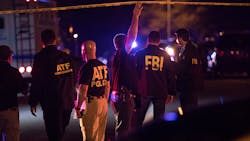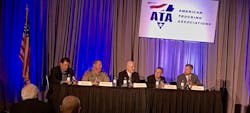AUSTIN, TX. The story shared by Floyd Dixon, managing director of corporate security at FedEx Freight, could have been so much worse.
In early March, several explosive devices were dropped off at homes or left out to be triggered by a tripwire around the Austin area. Several weeks later, another device exploded at a FedEx facility in the San Antonio area (no employees were seriously injured).
Immediately after, a security team was mobilized. FedEx assisted law enforcement agencies in determining that the package had originated in Austin, a sign all of these incidents were connected.
Within about a day, a suspect had been identified on video inside a FedEx Office store, and a second package was then discovered in the FedEx system before it exploded. On March 21, a 23-year-old man blew himself up as police officers closed in on him. He is believed to have killed two people and injured five others.
A key reason the case was solved so quickly after the San Antonio explosion was because of the “established relationships with law enforcement locally,” said Dixon, a former special agent with the U.S. Secret Service.
Dixon appeared at American Trucking Associations’ annual meeting with members of the law enforcement community to share ways to forge closer ties. The discussion was particularly timely, considering just days earlier a Florida man was arrested for allegedly sending at least a dozen explosive devices through the U.S. Postal Service.
Dixon said FedEx conducts first-responder walkthroughs across all of its operating companies. That allows law enforcement, firefighters, and medics to become familiar with the facility in the event “they have to respond for whatever reason.”
Furthermore, FedEx allows law enforcement to use its terminals as a training ground for K-9 dogs used to detect bombs, drugs, and other threats
Collin Mooney, executive director of the Commercial Vehicle Safety Alliance (CVSA), said the enforcement group and trucking “may not agree on every position,” but there is an open door for dialogue.
He urged continued engagement on electronic logs, stressing that vendors should speak up as any unexpected challenges with the federal mandate are uncovered. Mooney said CVSA regularly partners with state trucking associations to share information on roadside inspections and enforcement practices. That is critical because his group “can’t reach all truckers.”
Chris Nordloh, a major at the Texas Department of Public Safety, said his view is that law enforcement and trucking are on “different sides of the fence going in the same direction.”
While law enforcement may not be involved in writing regulations, the main goal is “equally applying them.” As an example, he referenced a fleet not taking steps to obtain a proper oversize or overweight permit.
“If they gamble they are not going to be stopped and underbid you, that is not fair,” he said.
About the Author
Neil Abt
Neil Abt is a former FleetOwner editor who wrote for the publication from 2017 to 2020. He was editorial director from 2018 to 2020.

